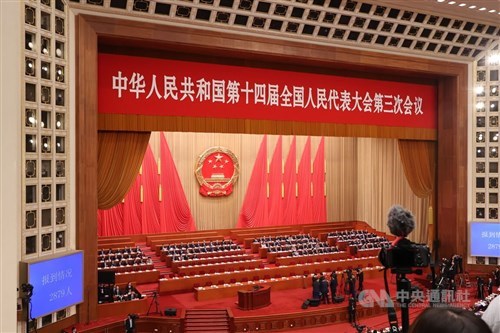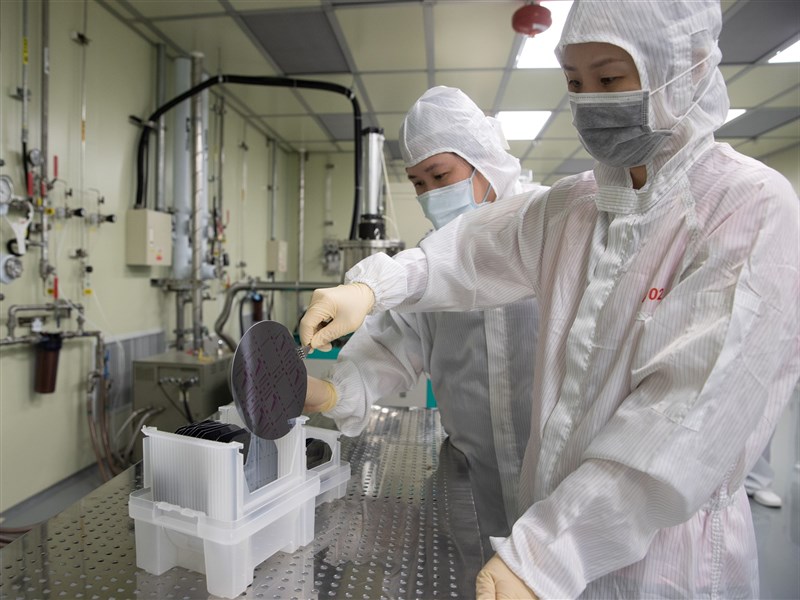ANALYSIS/Experts warn of China's 'subtle' actions, omitting 'peace' in Taiwan report
Taipei, March. 6 (CNA) Following a Chinese government work report presented during the "Two Sessions" on Wednesday, experts said China is likely to take more "subtle" actions against Taiwan independence in 2025, while also pointing to the omission of the word "peace" from a key policy report.
One day after China's Premier Li Qiang (李强) delivered the government work report during the "Two Sessions," cross-strait and defense experts on Thursday gathered at a seminar held in Taipei by the Institute for National Policy Research (INPR) to discuss their observations on the annual meetings and the implications for Taiwan.
Running until March 11, the "Two Sessions" consists of the National People's Congress, which held its opening meeting on Wednesday with Li presenting the report, and the Chinese People's Political Consultative Conference, which opened a day earlier.
In the 32-page report, a 128-Chinese character section on Taiwan included declarations to "resolutely oppose separatist activities aimed at 'Taiwan independence' and external interference" and "improve institutions and policies for promoting economic and cultural exchanges and cooperation across the Taiwan Strait."
'Subtle' actions against independence
"Although some experts said that more than 90 percent of the [Taiwan-related] content in this report is almost identical to previous ones, I still think there are some differences," INPR Director Wang Hung-jen (王宏仁) said.
He added said that while Taiwanese are "tired of hearing about" China's rhetoric on "anti-independence and pro-reunification," the mention of "anti-independence" in the report does not just highlight a stance but also sends a signal that it will play a more central role in China's policy toward Taiwan.
Wang recalled that in 2024, China took "a proactive approach" to suppressing Taiwan independence, such as undermining the island country's efforts to build its own narrative on the global stage and limiting its participation in international organizations.
"We thought that after Trump took office, China's actions against Taiwan on the international stage had quieted down, but that's not actually the case," said Wang, who also serves as a professor in the Department of Political Science at National Cheng Kung University.
China aims to create "a new strategic environment" for "anti-independence" in 2025, Wang said, noting that its actions are becoming more "subtle" and "refined."
The examples he cited included a February report by The Economist on China secretly securing support from over 70 countries for a potential invasion of Taiwan, as well as a warning by the think tank Pacific Economics about China's use of transnational crime groups in Palau, which could undermine Taiwan's diplomatic ties with the Western Pacific nation.
"It has shifted from being out in the open to happening behind the scenes," Wang said.
Missing 'peace'
Ma Chun-wei (馬準威), an assistant professor at Tamkang University's Graduate Institute of International Affairs and Strategic Studies, said it is also worth noting the choice of words in the two reports related to the "Two Sessions" and the annual work conference on Taiwan affairs.
Following the work conference -- held before the "Two Sessions" on Feb. 25-26 and attended by senior Chinese Communist Party (CCP) officials -- a report on the meeting was published on Feb. 27, which notably did not include the word "peace," Ma said.
The absence of "peace" marks the first time in the past decade that the word has been omitted from such a key policy report and is an "exceptionally rare" occurrence in CCP official documents on Taiwan-related issues, Ma added.
"I don't think this is a coincidence -- they are deliberately trying to convey a message," Ma said, adding that the highest-ranking CCP official who attended the work conference was Wang Huning (王滬寧), chairman of the National Committee of the Chinese People's Political Consultative Conference.
"He [Wang] has served under three generations of CCP leadership [Jiang Zemin (江澤民), Hu Jintao (胡錦濤), and Xi Jinping (習近平)], primarily assisting leaders in drafting speeches," Ma said.
He noted that Wang is "highly meticulous" when it comes to word choice and would certainly understand the significance of removing the word "peace" from the report.
"Fortunately, it [the word 'peace'] was back in the 'Two Sessions,'" Ma said, adding that it is worth paying attention to why it was removed from the work conference's report but remained in the report presented during the "Two Sessions."
Asked by CNA after the seminar about the difference in the use of the word "peace" between the two reports, Ma said it might be due to Taiwan's suspected participation in the multinational Joint Exercise Cobra Gold, which was co-sponsored by Thailand and the United States and kicked off in the Southeast Asian country on Feb. 25.
The Cobra Gold Combined Joint Information Bureau (CJIB) said on Feb. 26 that Taiwan's listing as a participant in the exercises was a "transcription error" that has since been corrected. The statement came after Taiwanese media reported a day earlier about a CJIB Facebook post that listed Taiwan as a participant in the annual joint exercise.
"Since these events [the exercise and the work conference] happened at the same time, including the word 'peace' in the report might have been difficult for CCP officials to justify internally," Ma said.
The work report delivered at the "Two Sessions" might have been finalized long before the meeting, with the word "peace" already included, which could explain the difference, he added.
"If its [the word "peace"] presence becomes inconsistent, we should be cautious," Ma said, noting that it could indicate growing dissatisfaction among CCP officials over Taiwan-related issues, potentially reaching a critical point.
![China's 'Two Sessions' place greater emphasis on Taiwan integration: Experts]() China's 'Two Sessions' place greater emphasis on Taiwan integration: ExpertsThe Taiwan-related section in China's government work report, presented during the "Two Sessions" on Wednesday, placed greater emphasis on the promotion of integration and unification of Taiwan with China, experts told CNA.03/05/2025 10:26 PM
China's 'Two Sessions' place greater emphasis on Taiwan integration: ExpertsThe Taiwan-related section in China's government work report, presented during the "Two Sessions" on Wednesday, placed greater emphasis on the promotion of integration and unification of Taiwan with China, experts told CNA.03/05/2025 10:26 PM![Trump's chip tariff cannot be implemented quickly: Expert]() Trump's chip tariff cannot be implemented quickly: ExpertAaron Friedberg, a politics and international affairs professor at Princeton University, said it would not be easy for the United States to rapidly implement a tariff on imported semiconductors because the cost of the policy to the country would be too high.02/22/2025 06:00 PM
Trump's chip tariff cannot be implemented quickly: ExpertAaron Friedberg, a politics and international affairs professor at Princeton University, said it would not be easy for the United States to rapidly implement a tariff on imported semiconductors because the cost of the policy to the country would be too high.02/22/2025 06:00 PM![Taiwan needs to act fast in response to Trump's tariff policy: Expert]() Taiwan needs to act fast in response to Trump's tariff policy: ExpertTaiwan needs to urgently focus on announcing policies and investment plans in support of U.S. President Donald Trump's administration, instead of hoping to change the American president's view on the semiconductor industry and trade, a defense and security expert has told CNA.02/21/2025 10:10 PM
Taiwan needs to act fast in response to Trump's tariff policy: ExpertTaiwan needs to urgently focus on announcing policies and investment plans in support of U.S. President Donald Trump's administration, instead of hoping to change the American president's view on the semiconductor industry and trade, a defense and security expert has told CNA.02/21/2025 10:10 PM
- Society
New Taipei freight train derailment causes delays
03/10/2025 02:25 PM - Business
Taiwan shares close down 0.52%
03/10/2025 01:41 PM - Sports
Hsieh, Zhang advance to women's doubles quarterfinals at Indian Wells
03/10/2025 01:23 PM - Politics
Former TPP leader Ko Wen-je leaves prison to attend father's funeral
03/10/2025 01:14 PM - Science & Tech
Hon Hai unveils new traditional Chinese language AI model
03/10/2025 01:01 PM


